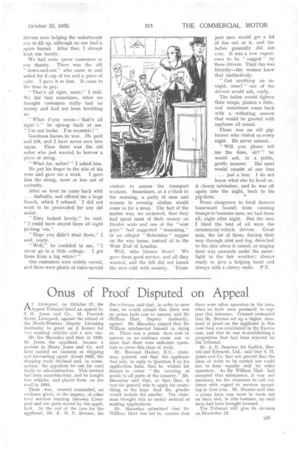Onus of Proof Disputed on Appeal A l' Liverpool, on October
Page 63

If you've noticed an error in this article please click here to report it so we can fix it.
17, the Appeal Tribunal heard an appeal by S. H. Jones and Co., 15, Fenwick Street, Liverpool, against the refusal of the North-Western Deputy Licensing Authority to grant an A licence for two existing vehicles and a new one.
Mr. Ian Macaulay said that, in 1919, Mr. Jones, the appellant, became a partner in Henry Jones and Co. and later carried on .business as shipping and forwarding agent. About 1922, the shipping trade declined and, in consequence, the appellant let out his road traffic to sub-contractors. This method had been unsatisfactory, and he bought two vehicles and placed them on the road in 1934.
There was, counsel contended, no evidence given, at the inquiry, of other road services running between Liverpool and the parts served by the appellant. At the end of the case for the applicant, Mr. E. H. P. Beanies, for
the railways, said that, in order to save time, he would submit that there was no prima facie case to answer, and Sir ..William Hart, Deputy Authority, agreed. Mr. Macaulay argued that Sir William misdirected himself in doing so. There was a prima facie case to answer, as no evidence came out to show that there were sufficient opera-; tors to cover this class of work.
Mr. Rowand Harker, K.C., chairman," pointed out that the applicant had said, in reply to Question 5 on his application form, that he wished his licence to cover "the carrying of goods to all parts of the country." Mr. Macaulay said that, at that time, it was the general rule to apply for everything, in the hope that the greater would include the smaller. The chairman thought this an unfair method of making applications.
Mr. Macaulay submitted that. Sir William Hart was led :to assume that
there were other operators in the area, when no facts were produced to support this inference. Counsel contended that Mr. Beames set up a higher standard of proof on the applicant in this case than was established in the Enston case, and that he was re-establishing a proposition that had been rejected by the Tribunal.
Mr. A. E. Baucher, for Garlick, Burrell and Edwards, Ltd., said that S. H. Jones and Co. had not proved that the class of work to be carried out could not be done equally well by other operators. As Sir William 'Hart had accepted that submission, it was not necessary for the objectors to call evidence with regard to services operating in that area. Mr. Beames said that a prima facie case must he made out on facts and, in this instance, no such facts had been brought forward.
The Tribunal will give its decision oil .November 12,
















































































































































